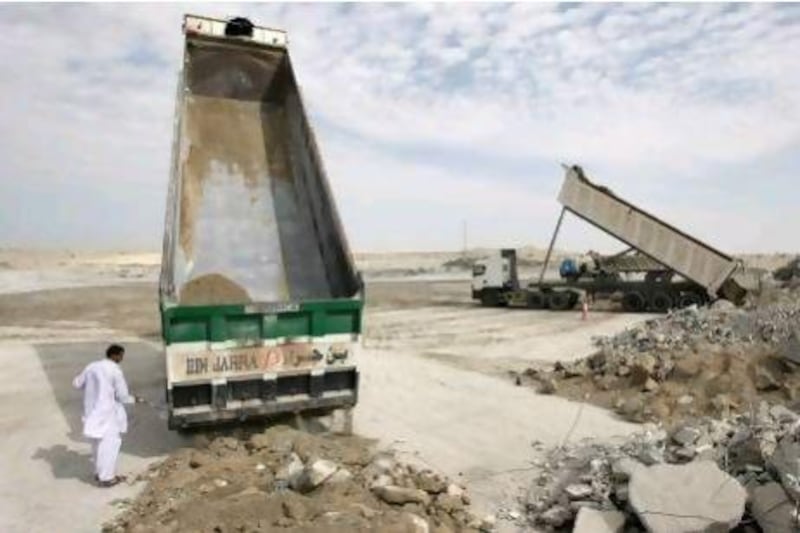ABU DHABI // The capital's only recycling plant for construction debris is to resume work next month after a stoppage of nearly a year.
The facility, near Abu Dhabi's main landfill in Al Dhafra, opened in May 2010 and cost Dh45 million.
It stopped processing waste at the end of November last year because its operator was struggling to sell the recycled material, which is suitable for use as a road base and in other infrastructure projects.
The global financial crisis meant fewer such projects, so there was less demand for the material. As a result, the plant has a stockpile of 1.5 million tonnes of recycled concrete, according to the Centre of Waste Management-Abu Dhabi.
The plant's revival is linked to the Etihad Rail project, which will see 1,200 kilometres of rail line laid across the country. The plant expects the project to consume more than a million tonnes of recycled concrete over a one-year period.
"Because of the Etihad Rail [contract] we will restart the plant on September 16," said Steve Patterson, waste services manager at Leighton Services, which operates the recycling plant on behalf of the Abu Dhabi Government.
The company was initially called Thiess Services Middle East, but it was renamed in March following some structural changes.
Construction and demolition debris is the largest source of waste in Abu Dhabi, at 9,000 tonnes a day.
The plant has the capacity to handle about 60 per cent of that, Mr Patterson said. "We could recycle more but, at the moment, the market for recycled products is still the bigger challenge than recycling it."
Apart from the rail project, plant managers hope to supply material for the upgrade of the E11 motorway, one of the country's largest civil engineering projects.
Volume is one challenge for the plant's management, price another.
"Some users are still unwilling to accept it," said Mr Patterson.
He explained that customers were still unfamiliar with the product, so cautious about it. They assume it is of inferior quality compared with alternatives, he said. Contractors also feel that, because the product's source is essentially waste, recycled concrete should be cheaper than freshly quarried rock. At 80 to 90 per cent of the cost of virgin material, it is deemed expensive by some.
"Yes, it is cheaper but some people do not consider it cheap enough," Mr Patterson said.
Glenn Platt, environmental manager at KEO Infrastructure, a consultancy in Dubai, said the Government should help build the market for recycled products.
"What is lacking in the UAE is specifications and policies on the use of that material," he said.
Mr Patterson agreed that Government intervention was necessary.
"If you look at the UK, people would not be recycling the amounts they do now if the Government did not put in place rules such as landfill taxes," he said.
In Abu Dhabi, use of recycled concrete is specified in a decree issued in 2010 and reissued in 2011, Mr Patterson said. The decree states that contractors should use a minimum of 40 per cent recycled product. But it is not clear who should be the regulating body, he added.
Regarding the future of the recycling plant, Mr Patterson said he was "quietly optimistic for the next 12 months." "I have no idea what is going to happen beyond that," he said. "It will be a good project over the next 14 years we have got left to run it, but it has been a very tough two years."





